Boiler Room Blu-ray Movie
HomeBoiler Room Blu-ray Movie 
Warner Bros. | 2000 | 120 min | Rated R | Mar 04, 2014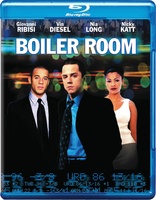
Movie rating
7 | / 10 |
Blu-ray rating
| Users | 4.5 | |
| Reviewer | 4.0 | |
| Overall | 4.0 |
Overview
Boiler Room (2000)
Seth Davis, a young college dropout eager to prove his worth to his disapproving father, stumbles upon a shady brokerage firm in Long Island that's making a killing in stock market sales. Hegets swept up in the high-stakes life of young salesmen whose professional role model is WALL STREET's ruthless Gordon Gekko. But Seth soon realizes that his company's profit, including his own ever-expanding paycheck, derives from the selling of phony stocks to under-educated buyers.
Starring: Giovanni Ribisi, Vin Diesel, Ben Affleck, Nia Long, Nicky KattDirector: Ben Younger
| Crime | Uncertain |
| Drama | Uncertain |
| Thriller | Uncertain |
Specifications
Video
Video codec: MPEG-4 AVC
Video resolution: 1080p
Aspect ratio: 1.78:1
Original aspect ratio: 1.85:1
Audio
English: DTS-HD Master Audio 7.1 (48kHz, 24-bit)
Spanish: Dolby Digital 2.0 (192 kbps)
Portuguese: Dolby Digital 2.0
Subtitles
English SDH, Portuguese, Spanish
Discs
25GB Blu-ray Disc
Single disc (1 BD)
Playback
Region A, B (C untested)
Review
Rating summary
| Movie | 4.0 | |
| Video | 4.0 | |
| Audio | 4.0 | |
| Extras | 3.0 | |
| Overall | 4.0 |
Boiler Room Blu-ray Movie Review
The Jackal of Long Island
Reviewed by Michael Reuben March 2, 2014Years before stock hustler Jordan Belfort reinvented himself as "The Wolf of Wall Street" and was glamorized in an Oscar-nominated Martin Scorsese film, the exploits of his Stratton Oakmont penny stock operation were dramatized in Boiler Room, the feature debut of writer/director Ben Younger. With awards season in full swing and Scorsese's film slated for release on March 25, Warner/New Line has apparently decided that the time is right to release Boiler Room on Blu-ray. Boiler Room is the antidote to The Wolf of Wall Street. Told from the point of view of a new broker at a fictionalized version of Belfort's operation, the film strips away the glitz and glamor in which Scorsese revels (and that are part of the guilty secret behind Wolf's popularity). Instead, Younger focuses on the underlying exploitation: of the clients by the brokers, of the brokers by the senior reps, and of everyone by the owner of the whole crooked operation. Younger's film appeared just before the dot.com crash of 2001 (from which, apparently, no one learned anything) and eight years before the mortgage meltdown of 2008, and it's a prescient indictment of an entire culture preoccupied with getting paid, no matter who you have to hurt in the process. Every single broker at the firm can quote from memory Gordon Gekko's speeches in Wall Street and Alec Baldwin's scene in Glengarry Glen Ross, just as wanna-be gangsta rappers quote Scarface. No one seems to get that those were bad guys. Younger shot Boiler Room on a modest budget of $7-8 million in practical locations in Brooklyn, Manhattan and Long Island. It received generally good reviews and grossed $28 million worldwide—a drop in the bucket for an expensive studio film like Wolf, but quite respectable for a small project by a first-timer. The film is more relevant today than ever. As con men like Jordan Belfort get to work on their "second act", usually with no effort to make restitution to their victims (an issue that Belfort is still fighting in the courts), it's worth looking back at the realities of the slimy schemes these guys ran, the immense damage they did, and the cultural orientation that enabled them every step of the way.
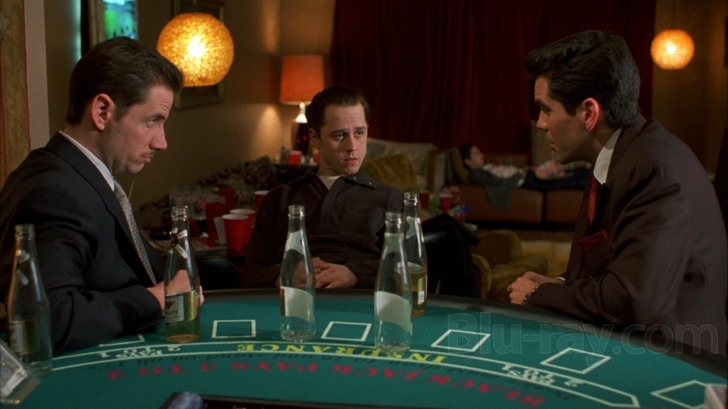
The Notorious B.I.G. said it best: "Either you're slingin' crack-rock, or you've got a wicked jump-shot." Nobody wants to work for it anymore. There's no honor in taking that after school job at Mickey Dee's, honor's in the dollar, kid. So I went the white boy way of slinging crack-rock: I became a stockbroker.The central character of Boiler Room is Seth Davis (Giovanni Ribisi), a bright Jewish boy who is a perpetual disappointment to his father (Ron Rifkin), a successful lawyer and now a federal judge. After secretly dropping out of college, Seth supports himself by operating a casino out of his apartment, where local college kids gamble away their pocket money. Seth runs a clean game, but of course the house always wins in the end. As Seth later comments in his voiceover narration, this illegal gambling operation turns out to be the most honest business of his youthful career. One night, two friends from the old neighborhood stop by. Seth hasn't seen Greg Weinstein (Nicky Katt) for years, but he can't help but notice the new Ferrari in which he arrives. Both Greg and his companion, Adam (Jamie Kennedy), look sleek and prosperous, and they drop thousands of dollars at Seth's blackjack table without concern. Before Seth knows what hit him, they've talked him into joining their brokerage firm, J.T. Marlin, where Seth becomes a trainee on Greg's team and receives a pep talk with the other trainees from Jim Young (Ben Affleck) about how they'll be millionaires. In months to come, sessions with Jim grow more threatening, as some of the new blood fail to transform themselves into the aggressive telemarketers required by J.T. Marlin and its owner, Michael Brantley (Tom Everett Scott). But Seth takes to the work with gusto, swept up in the restless energy and freewheeling spirit of inventive "closers" like senior broker Chris Varick (Vin Diesel). For a while, at least, he finds it exhilarating to reinvent himself on the telephone as someone older, more experienced, more important, more knowledgeable—whatever it takes to persuade the sucker at the other end to hand over his cash for whatever junk stock J.T. Marlin is peddling that week. Unfortunately for Seth, the same intelligence that made him good at running his own casino also makes him unsuitable for the penny stock business, which prefers fast talkers who don't think too much. Seth actually learns the SEC regulations he has to study to get his broker's license by passing the so-called "Series 7" exam. The rules on broker's commissions start him wondering how Michael Brantley can afford to pay J.T. Marlin brokers so much on sales of such cheap stocks. Then Seth goes further and starts making independent inquiries into the companies they're selling rather than relying on the approved firm research. At the end of this path lies the one thing a J.T. Marlin broker can't afford: concern for the customer's welfare, like that of Harry Reynard (Taylor Nichols), a hard-working father and husband who loses the entire down payment for his family's first house on a worthless stock that Seth hustles him into buying. One of the elements that Younger shows repeatedly in Boiler Room is the disjunction between the characters' wealth and their lack of maturity. When Seth visits the immense home of a senior broker, it's like a deluxe frat house, huge but unfurnished, with expensive toys scattered everywhere. Everyone eats pizza and gathers around the TV (watching Wall Street, of course). When the gang goes into the city for an evening, they carouse and brawl like teenagers from the neighborhood; nothing about them conveys that they're men of wealth and taste, which is why Affleck's Jim Young actually has to tell them to dress better. Seth's boyhood friend and new boss, Greg, considers himself better than the rest when it comes to financial planning, and he freely criticizes their colleagues (in profanely racist terms) when he and Seth are alone. But Greg turns out to be no more grown up than the kids he pushes around; he's just the biggest bully on the playground. That's undoubtedly why J.T. Marlin's pretty receptionist, Abbie (Nia Long), broke off their relationship, but in Seth she sees something different. He understands that there's more to life than money, even if he isn't yet certain what "more" is. Both Seth and Abbie are smart enough to have figured out that something is rotten at J.T. Marlin. "How many secretaries do you know who make eighty grand a year?" she replies, when Seth asks why she tolerates the testosterone-heavy environment. When the walls inevitably cave in, Abbie and Seth are the only ones who aren't utterly shocked.
Boiler Room Blu-ray Movie, Video Quality 

Boiler Room was shot on film by Enrique Chediak (Europa Report and 127 Hours) and finished photochemically. Chediak and Younger designed a specific style of lighting for the scenes shot on J.T. Marlin's trading floor, a cold and artificial look emphasizing blue, grays and a pale shade of yellow. This was meant to contrast with the rest of the film, which uses warmer colors, especially in Seth's apartment/casino or in scenes outside the office between Seth and Abby. Warner/New Line's 1080p, AVC-encoded Blu-ray superbly reproduces the film's color palette, down to the bright yellow of Greg's Ferrari. Blacks and shadow detail are also quite good, which becomes especially important in various scenes of night life and in one crucial sequence where Seth makes an unexpected late night visit to J.T Marlin's office. The image is just slightly less detailed than we have come to expect from the best transfers, but whether this is a weakness in the transfer or inherent in the source is difficult to determine. Younger confirms in his commentary that not one scene was shot on a soundstage, and with the low production budget, it's possible that the budget did not support the kind of time and equipment to allow for ideal lighting conditions. In the era of digital intermediates, such limitations can often be overcome in post-production, but Boiler Room dates from an earlier time. At 16.94 Mbps, the average bitrate is shockingly low, even by Warner's parsimonious standards. A two-hour film, with extras, deserves better than a BD-25. Boiler Room has a number of sequences featuring music-video-style editing, where the bitrate spikes way up, but it also has lengthy scenes of simple conversation (e.g., between Seth and his father), where bandwidth can be conserved by skillful compression. On my 72" screen, the image was free of artifacts, but it's entirely possible that projection at larger sizes would reveal artifacts or anomalies caused by overcompression.
Boiler Room Blu-ray Movie, Audio Quality 
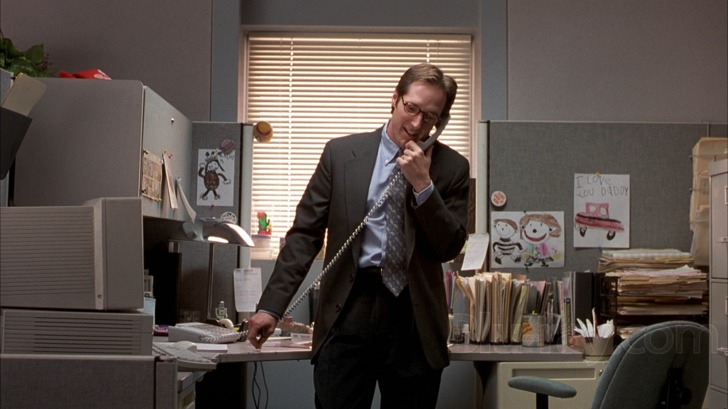
Boiler Room was released to both theaters and DVD with a 5.1 soundtrack, but for Blu-ray it has been given a 7.1 soundtrack, presented in lossless DTS-HD MA. It's not clear what the additional two channels add to the experience. The two biggest sonic events in the film are the crowd of yelling brokers (whether at work or at the massive celebration thrown for his staff by J.T. Marlin's owner) and the club/rap soundtrack mix supplied by DJ and composer, The Angel. The latter, which includes cuts by 50 Cent, Beanie Sigel, Slick Rick, Lords of the Underground and many more, is reproduced with thunderous authority and deep bass extension. Dialogue is always clear and centered.
Boiler Room Blu-ray Movie, Special Features and Extras 
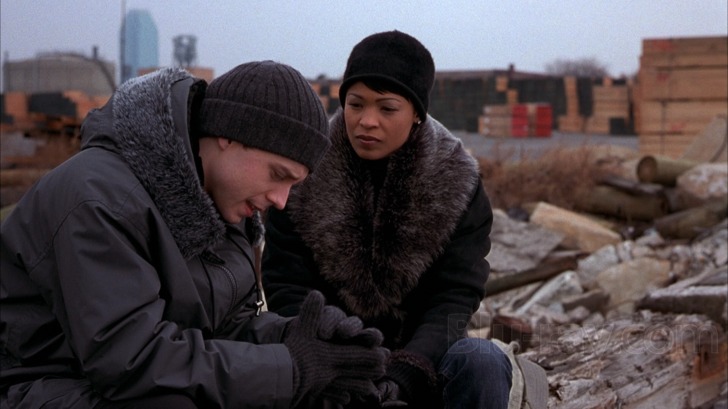
The extras have been ported over from New Line's 2003 DVD of Boiler Room, but not all of the DVD's extras have been included. Chief among the omitted items is the 5.1 isolated score with additional composer commentary by The Angel. The DVD-ROM features have been dropped as usual, but here they included the film's screenplay and a reproduction of the original website.
- Commentary with Director Ben Younger, Producer Jennifer Todd, Actor Giovanni Ribisi and Composer The Angel: Younger and Todd were recorded together, while Ribisi and The Angel were recorded individually; the three interviews were then edited together into one continuous commentary track. Younger and Todd are informative on the development, casting and actual production, although (probably for legal reasons) they remain silent on the real-life origins of the story. Ribisi discusses his own background, his research for the part and his recollections of shooting various scenes. The Angels talks about her approach to the score and the ironies of being a woman working on a subject matter, and in a musical genre, that is so heavily identified with men.
- Deleted Scenes (480i; 1.85:1, enhanced; 8:35): A "play all" function is included. The most important item is the "original ending", which Younger and Todd discuss in the commentary. It probably sounded better on paper than it played on film, and test screenings told them they needed to change the ending. The ending of the film as released is clearly superior.
- Hotel Room Party
- Seth's Employees at School
- Cruising with the Boys
- Dinner Joke
- Original Ending
- Theatrical Trailer (480i; 1.33:1; 2:22): "Welcome to the New American Dream."
Boiler Room Blu-ray Movie, Overall Score and Recommendation 
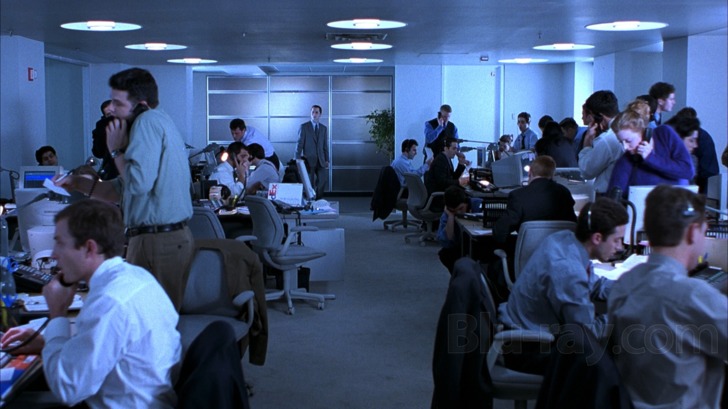
Perhaps the most difficult role in Boiler Room is that of Judge Martin Davis played by Ron Rifkin, because he has to represent the stodgy old school of morality and values. At the same time, Rifkin has to convey the profound disappointment of a father who, as he learns the enormity of his son's misdeeds, can't help but ask himself, "Where did I go wrong?" Despite the inherent streak of sentimentality in some of the scenes between the judge and Seth, Rifkin is a fine enough actor to make an effective representative for the cause of virtue. It's a good thing, because Judge Davis' question to himself is the larger one that Boiler Room asks the viewer and that The Wolf of Wall Street buries under its celebration of excess: Where did we all go wrong? When did the allure of easy money becomes so pervasive that someone like Jordan Belfort became possible? The question is still worth asking. Highly recommended as a film, with minor concerns about the Blu-ray image, as noted above.
Similar titles
Similar titles you might also like

The Gambler
2014

21
2008

Runner Runner
2013

Donnie Brasco
Theatrical Edition
1997

Rounders
1998

The Next Three Days
2010

A Time to Kill
1996

Live by Night
2016

Wall Street
1987

A Bronx Tale 4K
30th Anniversary Limited Collector's Edition | Includes 4 Collectible Postcards
1993

Revolver
2005

Out of the Furnace
2013

The Drop
2014

Kill the Irishman
2011

Mobsters
1991

Staten Island
Little New York
2009

State of Play
2009

Mr. Brooks
2007

Traitor
2008

Boyz n the Hood
1991